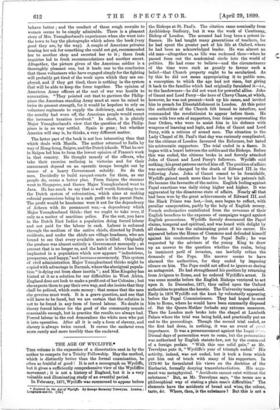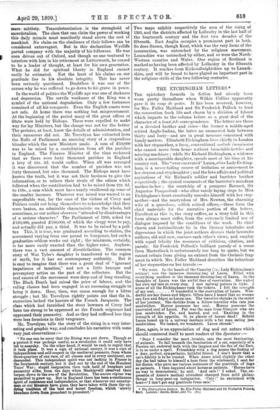THE AGE OF WYCLIFFE.* Tars volume is the expansion of
a dissertation sent in by the author to compete for a Trinity Fellowship. May the method, which is distinctly better than the formal examination, be often as fruitful of good ! It is not a monograph on Wycliffe, but it gives a sufficiently comprehensive view of the Wycliffite movement ; it is not a history of England, but it is a very valuable and illuminating study of an eventful period.
In February, 1377, Wycliffe was summoned to appear before • England 4% thet Age of WyclAfe. By George Macaulay Trevelyan. London : Longmans and Co. [16e.] the Bishops at St. Paul's. The citation came nominally from Archbishop Sudbury, but it was the work of Courtenay, Bishop of London. The accused had long been a potent in- fluence. He had taught many generations of teachers, for he had spent the greater part of his life at Oxford, where he had been an acknowledged leader. He was almost an old man—altogether so, as life was reckoned then—when he passed from out the academical circle into the world of politics. He had come to believe—and the circumstances of the time were such as greatly to favour such a belief—that Church property ought to be secularised. As by this he did not mean appropriating it to public uses, a conception to which the age had not risen, but giving it back to the families which had originally furnished it—i.e., to the landowners—he did not want for powerful allies. John of Gaunt and Lord Percy—the hero of Chevy Chase, at which, however, he was not present—took up his cause, and invited him to preach for Disestablishment in London. At this point the authorities of the Church felt bound to interfere, and commanded the revolutionist to appear before them. He came with two sets of supporters, four friars representing the four Orders, who were to assist him in his defence with weapons of learning and logic, and John of Gaunt and Lord Percy, with a retinue of armed men. The situation in the Lady Chapel of St. Paul's that day was curiously complicated, for the citizens of London favoured the Reformer, but hated his aristocratic supporters. The trial ended in a fiasco. It began with a brawl between the nobles and the Bishops. Before this was ended, the citizens broke in and fiercely attacked John of Gaunt and Lord Percy's followers. Wycliffe said nothing; his great patrons carried him off. The position of affairs was materially changed by the death of Edward III, in the following June. John of Gaunt ceased to be formidable. Wycliffe gained much more than he lost by his patron's fall. He became the favourite of the nation. English feeling against Papal exactions was daily rising higher and higher. It was aggravated by the disastrous state of affairs. Nearly all that had been won by the great achievements of Edward III. and the Black Prince was lost,—lost, men began to reflect, with peculiar exasperation, partly by the help of English money. French ecclesiastics contributed from the revenues of their English benefices to the expenses of campaigns waged against English possessions. Wycliffe fiercely denounced the Papal claims, temporal and spiritual, and was heard with delight by all classes. It was the culminating point of his career. He appeared before the House of Commons and defended himself against his condemnation by the Papal Bulls ; he was requested by the advisers of the young King to draw up an answer to the question whether the realm, being in imminent peril of invasion, can lawfully refuse the demands of the Pope. His answer seems to have alarmed the authorities, for they ended by imposing silence on him. The Pope could not afford to ignore so daring an antagonist. He had strengthened his position by returning from Avignon to Rome, and he ordered Wycliffe's arrest. It was some months before the English Bishops ventured to act upon it. In December, 1377, they called upon the Oxford authorities to produce the heretic. The University temporised. Early in 1378 Wycliffe cut the knot by voluntarily appearing before the Papal Commissioners. They had hoped to send him to Rome, where he would have been summarily disposed of. But the Queen-Mother forbade any extreme measures. Then the London mob broke into the chapel at Lambeth Palace where the trial was being held, and practically put an end to the proceedings. Though the second trial ended, as the first had done, in nothing, it was an event of great importance. It was a pronouncement against the Inquisition. Dismal days of persecution were to come, but the persecution was authorised by English statute-law, not by the command of a foreign prelate. "With this one solid gain," as Mr. Trevelyan puts it, " Wycliffe's year of triumph ended." His activity, indeed, was not ended, but it took a form which put him out of touch with many of his supporters. In 1379-80 he formulated his views on the doctrine of the Eucharist, formally denying transubstantiation. His argu- ment was metaphysical. "Accidents cannot exist without the substance." But, as Mr. Trevelyan says, "the terms are a philosophical way of stating a plain man's difficulties." The elements have the accidents of bread and wine, the colour, taste, &c. Where, then, is the substance I But this is not a mere- subtlety. Transubstantiation is. the stronghold of sacerclotalism. The class that can claim-the power of working this daily miracle must manifestly stand above the rest of mankind: -No claim on the obedience of their fellows can be considered extravagant. But in this declaration Wycliffe parted company with the majority of his followers. He was soon driven out of Oxford, and though no one ventured to interfere with him in his retirement at Lutterworth, he ceased to be a leader of thought, at least for his own generation. What -he did for spiritual liberty in England cannot easily .be estimated. Not the least of his claims on our gratitude lies in his absolute integrity. This has never been. seriously questioned. Doubtless it was one of the causes why he was suffered to go down to his grave in peace.
In the world of politics the Wycliffe age was one of darkness and depression. The servile weakness of the King was a symbol of the national degradation. Only a few fortresses remained of all his conquests. Even the English coasts were not safe. At home there was nothing but misgovernment.
At the beginning of the period many of the great offices of State were held by Bishops. These were expelled to make way for lay Ministers, but the change was not for the better. The prelates, at least, knew the details of administration, and their successors did not. Mr. Trevelyan has extracted from the Rolls of Parliament an amusing story of a stupendous blunder which the new Ministers made. A sum of £50,000 was to be raised by a contribution from all the parishes in England. The Finance Minister of the time reckoned that as there were forty thousand parishes in England a levy of 22s. 3d. would suffice. When all was arranged it was discovered that the number of parishes was not forty thousand, but nine thousand. The Bishops must have known the truth, but it was not their business to give the information, or to relieve their rivals of the odium which followed when the contribution had to be raised from 22s. 3d, to 116s., a sum which must have nearly swallowed up some of the smaller, incomes. Whatever was raised was wasted in an unprofitable war, for the sons of the victors of Crecy and Poitiers could not bring themselves to acknowledge that they were beaten, an admirable characteristic on the whole, but sometimes, as our author observes." attended by disadvantages of a serious character." The Parliament of 1380, asked for £100,000, granted £100,000, of which the clergy were to pay, and actually did pay, a third. It was to be raised by a poll- tax This, it is true, was graduated according to station, the assessment varying from one pound to fourpence, but such a graduation seldom works out right ; the minimum, certainly, is far more easily exacted than the higher rates. Anyhow, there was a vast amount of dissatisfaction. The common story of .Wat Tyler's daughter is transferred to the region of, myth, for it has no contemporary authority. But it is easy to imagine that there was a great deal of "ignorant impatience of taxation," and not a little brusque and peremptory action on the Tart of the collectors. But the real causes of the movement were deep and of long standing.
The Black -Death had raised the price- of labour, and'- the ruling classes had been engaged in an unceasing struggle to bring it down. Here, then, was cause enough for a bitter struggle ; but Mr. Trevelyan rightly points out that the in_ surrection lacked the horrors of the French Jacquerie. The class which had furnished the stout bowmen of Crecy had been too strong to be oppressed as the French seigneurs had oppressed their peasantry. And as they had suffered less they were less ferocious in their vengeance.
Mr.. Trevelyan tells the story of the rising in a very inter- esting and graphic way, and concludes his narrative with some very just observations :— " No one can be sorry that the Rising was put down. Though as a protest it was perhaps useful, as a revolution it could only have led to anarchy. On the other hand, it would be rash to regret that it took place. It was a sign of national energy, it was a sign of independence and, self-respect in the medireval peasants, from whom three-quarters of-our race, of all classes and in every continent, are descended. This independent spirit was not lacking in France in the fourteenth century, but it filed out by the end of the Hundred Years' War; stupid resignation then took hold of burghers and peasantry shire, from the days when Machiavelli observed their torpor; down to the eve of the Revolution. The maim regime was permitted to grow up. But in England there has been a continuous spirit of resistance and independence, so that wherever our country- Mini or our kinsmen have gone, they have taken witIr them the un- dyhg tradition of the best and surest freedom, which 'slowly bioadeñz down from precedent to precedent: " Two maps exhibit respectively the area of the rising of 1381, and the districts affected by Lollardry in the last half of the fourteenth century and the first two decades of the fifteenth. East Anglia occupies a prominent part in both. So does Sussex, though Kent, which was the very focus of the insurrection, was untouched by the religious movement. Lancashire was untouched by either, and so were the North- Western counties and Wales. One region of Scotland is marked as having been affected by Lollardry in the fifteenth century. It reaches from Kirkcudbrightshire up to Lanark- shire, and will be found to have played an important part in the religious strife of the two following centuries.























































 Previous page
Previous page